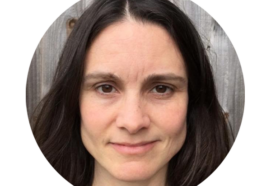All children and young people can feel worried about attending school, but for some school can become challenging, stressful, and distressing, potentially building into school avoidance. School avoidance is when a child refuses to attend a school or has difficulty remaining in school the entire day. It can be exhausting for both the child and parent/carer, with mornings in particular can become a flashpoint. Even if a child does get into school the day can be filled with anxiety, and be disruptive for the child, teachers, and other pupils. After school day finishes the feeling of dread for the next day can start, and the process snowballs. So what can we do?
Slides Angela Merrylees
Slides Chris Atherton
Slides Marie Harrison & Hannah Gray
About the session
Organised by the ACAMH Scotland Branch this session will look at the complex factors contributing to pupils’ non-attendance at school. There will be consideration of evidence-based assessment and practical intervention approaches to support children back into education. There will also be an exploration of children and young people’s rights, as well as meaningful ways of gathering their views. We will also hear from a young person who will share their lived experience of school avoidance.
Learning outcomes
- Increased understanding of the factors – including social, emotional and psychological factors – which contribute to non-attendance
- Effective assessment approaches to non-attendance
- Pragmatic ways of supporting children and young people back to school
- Consideration of children and young people’s rights and views
About the talks
Marie Harrison and Hannah Gray – The Voices and Rights of Children and Young People who are not Attending School
The presentation will be delivered by Enquire and the Children’s Views Service. Both services are part of My Rights, My Say, a Scottish wide network aimed at ensuring children with additional support needs aged 12-15 are able to exercise their rights to be heard in education processes that affect them. The presentation will provide a statistical overview of issues presented by children with regards to school absence, as well as the rights held by children and young people to be heard and have their views considered. The presentation will move on to talk about the role of My Rights, My Say, and give practical examples of how to seek children’s views.
Learning points
- To gain understanding of My Rights, My Say and the role it plays in supporting Scottish ASN learners to be heard
- To increase knowledge around children’s education rights and the reasons behind non-attendance
- To explore practical ways of supporting children and young people to share their views in education related decision-making processes
Angela Merrylees-Stalker
Supporting Children and Young people Back to School – This session will focus on individual planning and strategies that support young people back into school after a period of non-attendance.
Chris Atherton
Why Learning Well Matters – This session will focus on how East Renfrewshire Council is responding to emotionally based school absence. It will examine the language used to describe non-attendance; the complex factors contributing to children and young people not going to school, and how holistic, evidence-based assessment and intervention can lead to better outcomes for young people who find it extremely difficult to attend school.
Learning points
- To understand more about emotionally based school absence (EBSA)
- To understand how schools can be proactive and responsive in their approach
- To learn more about how one council is beginning to provide more intensive support for those experiencing EBSA
About the speakers
Chris Atherton is a Senior Educational Psychologist in East Renfrewshire Council. He works with practitioners in early years, primary and secondary school settings to support children, young people and families with additional support needs. Chris has specific interests in autism, mental health and wellbeing. He supports the council’s multi-agency Heathier Minds Service by developing and implementing training courses for practitioners and producing online resources. Chris also manages East Renfrewshire’s Learn Well Service, which supports young people with emotionally based school absence, including those who are Care Experienced with low school attendance. Access to some of Chris’s work can be found on the Healthier Minds website.
Angela Merrylees-Stalker is a Principal Teacher in East Renfrewshire Council. Angela’s experience spans early years through to secondary age and she has a particular interest in supporting children and young people with a range of additional support needs. As a Principal Teacher with the Healthier Minds Service, she supports children, young people and families from primary to secondary age with emotional wellbeing needs. Angela has also supported and led the development and implementation of a range of authority training courses, materials and resources for practitioners working with children and young people in the areas of nurture practice, understanding anxiety and Emotional Based School Absence (EBSA). Recent research interests have included qualitative studies in the perceptions of Educational Psychologists on EBSA. Access to some of Angela’s work can be found on the Healthier Minds website.

Marie Harrison joined Children in Scotland in 2022. Over the past 15 years she has worked to promote children’s rights through lobbying and advocacy posts both in Scotland, Denmark, Kenya and the Netherlands. The main focus of her work has been to promote the rights of children with additional support needs and to support children to share their views in all decision making processes that affect them. She has been involved in various projects aimed at creating awareness of the UNCRC and children’s rights both on international, national and local level. Marie holds a degree in Aesthetics and culture and has used her skills to develop creative toolkits to support children with additional support needs to share their views in child-centred and unique ways that are meaningful to the individual child. She is currently studying towards her MA in Children and Young People’s Participation and leadership at the University of Highlands and Islands.

Hannah Gray joined Enquire in September 2015. She is involved in managing Enquire’s helpline where they offer support and advice parents, carers, professionals and young people about children’s rights to support when they are struggling with their learning. She also works on Enquire’s policy and influencing work and outreach programmes. Previously, Hannah worked with the Scottish Government in education policy and as an employment support worker for young adults with learning difficulties. For three years she chaired a young people’s group at the Sick Children’s Hospital in Edinburgh – helping make sure the group’s views and experiences where taken into account. Hannah studied Social Anthropology at Aberdeen University.


